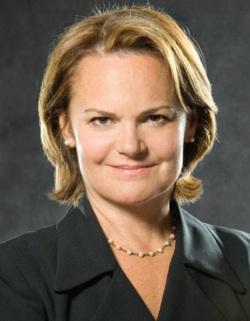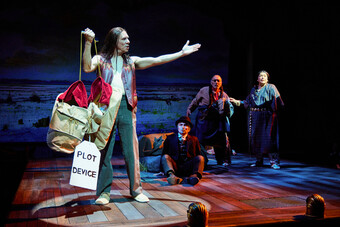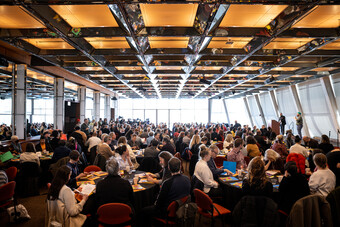Teresa Eyring
In Search of the Artistic Home
Jamie Gahlon has asked theatre artists from around the country to talk about their personal search for an artistic home. Teresa Eyring continues this series.

What makes an artistic home? “I thought it was like playing house. I would have this little theatre and they would write plays and all their friends would be in them and live happily ever after.” -Ellen Stewart, founder, La MaMa Experimental Theater Club
An artistic home is something that is difficult to define but impossible to mistake. Having travelled to theatres across the country, I can tell you there is a palpable well of energy, a current of shared purpose, that runs through you as soon as you walk in the door. That well of energy does not reside in bricks and mortar, and though it may begin as a singular vision, it does not belong to a single person alone.
Rather, an artistic home is the ceaselessly evolving sum of the care and passion, the sweat and ideas, that are poured daily into foundations not of stone but of creative spirit. Everyone contributes and belongs to that ultimate creation, whether playwright, actor, scenic carpenter, development staffer, trustee or box office attendant. Everyone has skin in the game, adding to and drawing from that well of energy, that current of shared purpose. Everyday its shape shifts a little, but some essential contours remain, and when you’re within it, you can’t mistake it, you know you’re home.
You also can’t mistake the lack of it, that ache when the feeling of home goes, when the current fades and the well runs dry. No one gets through life without tasting a little of the bitterness of exile: from a country, from a job or city or person we loved, from our own sense of self. As TCG reaches the end of our 50th Anniversary year, we look out at a thriving field that nonetheless continues to ask the question, “where is home?”
Rather, an artistic home is the ceaselessly evolving sum of the care and passion, the sweat and ideas, that are poured daily into foundations not of stone but of creative spirit.
Where and how did you find yours and what does it mean to you? I grew up in a big family, six kids. We all got along with each other, making things together when we weren’t getting into trouble. At the center of it all was our mother, and as we grew up and moved out, she became the repository of family knowledge, past and present. She was the steward of our sense of home.
I went off to work at a remarkable set of organizations, theatres such as Woolly Mammoth Theatre Company, the Guthrie Theater, the Wilma Theater and the Children’s Theatre Company. These organizations all matched a clear vision to a shared sense of purpose, and each in their own unique way felt like home.
My mother passed away in April 2011. A few months after she was gone, it hit me like a ton of bricks: who would hold onto all our old stories? Who would weave the disparate threads of our lives into the fabric of a family? My siblings and I are working hard to share that role, each of us making a commitment to pay attention, to stay in touch, to organize events where we'll come together and tell the old stories. My mother's role and her soul have been spread among us, which is precisely what she would have wanted.
Now I have found my true artistic home in the theatre field itself. It would seem impossible to call such a wide and diverse field a single home if we didn’t need each other so much. TCG’s role is to weave those disparate threads of our field into a movement, but we cannot do it alone. We need your commitment to pay attention, to stay in touch, to come together to share the old stories, the new ideas, the working models that will serve as blueprints for our ever-evolving home.
How can one build an artistic home for others? In doing so, we must first acknowledge that many theatre people feel like exiles. Our system’s reliance on freelancing makes it difficult for many artists to feel a connection to a single community. How can we level the playing field and create access for all theatre people to draw from and give back to that well of energy?
One of the tactical ways TCG has addressed this issue is by committing, through our Book Program, to publishing a playwright’s entire body of work, not just the plays that happen to be hits. TCG grant programs such as the NEA Theatre Residency Program for Playwrights and the National Theatre Artist Residency Program, the Fox Foundation Resident Actor Fellowships, Leadership U(niversity) and The New Generations Program Future Leaders have provided resources towards deepening the bond between individuals and institutions. Through our convenings and teleconferences, we seek to cultivate that field-wide sense of home.
At our National Conference in Boston this week, we’ll be sharing our new vision statement and elements of our strategic plan, both of which realign our programming towards serving theatre people. It is our hope that this will widen that shared well of energy, and rekindle our mutual current of purpose. No more exiles: a renewed movement needs everyone to move.
What is the artistic home of the future? For a moment, let’s move towards the future by remembering the past. TCG published in 1988 The Artistic Home, a report by Todd London from the proceedings of TCG’s National Artistic Agenda Project, drawn from nationwide meetings among artistic leaders. Among many valuable findings, TCG’s then executive director Peter Zeisler wrote "one of the most important results of the meetings was to bring into focus the debilitating effects of isolation on artists— a byproduct of the field's successful decentralization, which has often left artistic directors to cope alone or on a local basis with artistic matters of national importance and applicability." The premise that theatres could be magnetic centers of their communities, where art, not money, would be the driving motivator, had frayed and the term "artistic deficit" was used to describe the health of the field. Sound familiar?
Some might say a little too familiar, though the extraordinary growth and diversity of our Membership (from 15 theatres in 1961 to over 500 today) serves as reminder that we have not been running in place. And we have more tools at our disposal than ever, from Twitter and the blogosphere to new systems like TCG’s year-round conference platform and the Center for the Theatre Commons where you’re reading this now. These tools represent a unique opportunity to break through those old conversations and widen our common ground.
So it is that we find ourselves at the end of one frontier, staring into the uncertain distance of the next. The resident theatre movement succeeded so far beyond all expectation that we have found new, grander expectations. I do not believe that we can make those expectations come to pass alone, playing at separate houses. We need to come together, to pay attention, to use our new high tech to stay in high touch. The souls of our founders live in us, and we can afford no exiles. Come home again.












Comments
The article is just the start of the conversation—we want to know what you think about this subject, too! HowlRound is a space for knowledge-sharing, and we welcome spirited, thoughtful, and on-topic dialogue. Find our full comments policy here
Lana, most of the plenary sessions will be livestreamed here (stay tuned for schedule): http://www.tcg.org/events/c...
As for joining in the online discussion, this is a year-round platform that we'll be opening up to all TCG Member Theatre staff, so as a member of Rude Mechs, we'd love to have you. Email me at [email protected] and I'll set you up with access and a profile right away!
I wonder if are there ways those of us who can't afford the conference every year can be a part of the conversation? Are you livestreaming anything we can join? Can we join online discussions in the "conference platform"? Thanks for sharing!